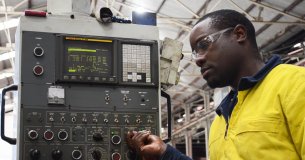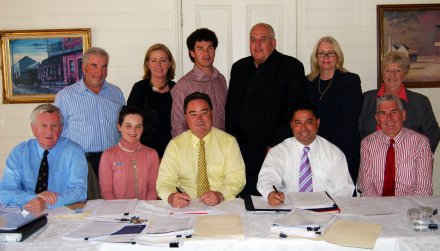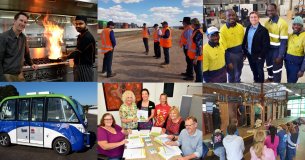-
Featured Items
-
Featured Resources
 Funding & Grants
Don't miss out on funding opportunities. Stay informed with our up to date online listings and email notifications.
Read More
Funding & Grants
Don't miss out on funding opportunities. Stay informed with our up to date online listings and email notifications.
Read More
 Skilled Migration
Our services help both applicants and employers, to learn more, develop plans, submit applications, and settle in.
Read More
Skilled Migration
Our services help both applicants and employers, to learn more, develop plans, submit applications, and settle in.
Read More
 Research and Analysis
Good research and analysis makes the case. How can our resources and services help your project or application?
Read More
Research and Analysis
Good research and analysis makes the case. How can our resources and services help your project or application?
Read More
 Information & Data Resources
With resources like REMPLAN, Regional Knowledge Base, and decades of data, discover how we can help your project.
Read More
Information & Data Resources
With resources like REMPLAN, Regional Knowledge Base, and decades of data, discover how we can help your project.
Read More
-
Stay InformedSubscribe to one or more of our regular email subscriptions, to be kept up to date on news and funding opportunities for the region
-
-
Our Region
- Our Region
- Regional Plan
- Regional Data
- Current Regional Issues
- Population Migration Analysis for 2016-21
- Job Vacancies Continue at All-Time High
- National Debt - What it Means for Our Economy?
- The True Value of Home Solar
- The Economic Impacts of Local Government Amalgamations
- State of the Regions Report 2014-15
- Antifragility - A different take on regional economic development
- Biohubs - Collaborative Waste Management
- Attracting New Residents
- Socio-Economic Impacts of the Murray Darling Basin Plan
- Murray Darling Basin Water Recovery
- Growing Businesses
- The Northern Inland Economy
- Geographical Overview
- Major Industry Sections
- Our Services
- Grants and Funding
-
Skilled Migration
- Skilled Migration
- Skilled Employer Sponsored Regional Visa
- Skilled Work Regional Visa (subclass 491)
- Temporary Seasonal Workers
- Designated Area Migration Agreement (DAMA)
- Helpful Information for Visa Holders
- Information for Employers
- Case Studies
- Payment Details
- Advice & Further Information
- Contact Details
- News & Events
-
Our Projects
- Our Projects
- Current Projects
- Skilled Migration
- Wool Works - Wool Training Schools
- Metal Works - Welding and Fabrication Schools
- Come On Inland
- Stories of Resilience
- Alt Brothers Beekeeping - Glen Innes
- Carelle's Toy Store - Glen Innes
- Greenhill Orchards - Arding
- Gwydir Meats - Warialda
- Kaputar Motors - Narrabri
- Moonbi General Store - Moonbi
- Sandstock - Tingha
- Sherelle Fashions - Tenterfield
- Sleepy Merino - Inverell
- Tenterfield Chamber of Toursim, Industry and Business - Tenterfeild
- The Welders Dog - Armidale
- Walcha Veterinary Supplies - Walcha
- AGCAP - Agribusiness Careers & Professions
- Northern Inland Regional Investment Profile
- Past Projects
- Digital Economy Strategy
- Business Growth Project
- Go Digital
- How to Start an Online Business
- Create Your Website Using Squarespace
- How to Edit Your Squarespace Site - Part 1
- How to Edit Your Squarespace Site Part 2
- Add a Shop to Your Squarespace Site
- Start a Blog and Find out What Customers are Searching
- 14 Tips For a Better Blog Post
- Which Social Media Platforms are Best for Your Business
- How to Use Facebook Effectively For Your Business – Part 1
- How to Use Facebook Effectively For Your Business – Part 2
- Instagram Tips for Business
- Catching Up, More Instagram & Dealing with Haters
- Getting Started with Twitter for Business
- Social Media Scheduling Tools
- How to Start an Etsy Shop – Part 1 – Research
- How to Start an Etsy Shop – Part 2 – Signup
- Online Security for Your Business
- Product Photography and Website Images: Your Guide
- 5 Tips to Improve your Productivity in your Business
- Best Online Business Resources
- How to Improve Your Communication Skills and Win More Clients
- NBN Coordinator
- Putting Power Back in the Regions
- Road Freight Study
- Town Audit Benchmarks
- Food and Wine
- Youth Survey
- Digital TV Switchover Assistance
- Northern Inland Transport Guide
- Live.Train.Work
- Northern Inland Innovation Awards
- Northern Inland Innovation Awards - 2017
- Northern Inland Innovation Awards - 2016
- Northern Inland Innovation Awards - 2015
- Northern Inland Innovation Awards - 2014
- Northern Inland Innovation Awards - 2013
- Northern Inland Innovation Awards - 2012
- Norther Inland Innovation Awards - 2011
- Prime Super Northern Inland Innovation Awards - 2010
- Prime Super Northern Inland Innovation Awards - 2009
- Northern Inland Innovation Awards - 2007
- Northern Lights Project
- NBN Smart Home
- Murray Darling Basin
- Moree Plains Business Workshops
- Namoi Investment Prospectus
- Industrial Land
- Bioenergy and Local Electricity Retailing
- Northern Inland Business Energy Assessment
- Skills for the Future
- Impacts of COVID-19 on Businesses
- Past Projects of NIRDB
- Aboriginal Employment and Enterprise in the Gunnedah Region
- Art as an Industry
- Aviation Survey
- Farm Forestry - Northern Inland Forestry Investment Group
- New England North West Film Strategy
- Northern Inland Excellence in Business Awards
- Food and Wine 2003 - 2008
- Prime Super Northern Inland Innovation Awards 2009
- Regional Business Networking Program
- Regional Leadership Course 2008
- Viticulture Strategy 2002-2003
- About Us
- Contact Us
- Other Resources
- Privacy and Legal
- Search
- News & EventsNews & Events
- NewslettersNewsletters
- Regional Development Australia up & running in Northern Inland NSWRegional Development…
Back to Newsletters

Regional Development Australia up & running in Northern Inland NSW
Sunday 13th of September 2009

Foundation Members of Regional Development Australia – Northern Inland… Front row: Charles McCarthy (Tamworth); Mary Hollingworth (Deepwater); Deputy Chair, Kevin Dupé (Armidale); Chair, Kevin Abey (Armidale); and Interim Executive Officer, Don Tydd Back row: John Christensen (Nowendoc); Heather Ranclaud (Willow Tree); Neil Argent (Armidale); Les Parsons (Inverell); Meryl Dillon (Moree); and Colleen Fuller (Gunnedah) Absent: Ray Tait (Tamworth) and Scott McLachlan (Duri).
A new era has begun for the New England North West, with the first meeting of the newly formed Regional Development Australia - Northern Inland in Armidale on Friday.
The inaugural meeting of Regional Development Australia - Northern Inland (RDANI) was a grueling session, as the foundation committee members debated strategic directions, projects, and immediate priorities, while establishing the operational foundations of the new regional body.
The foundation Chairman on the Committee, Kevin Abey of Armidale described the regional implications of seeing Regional Development Australia up and running in Northern Inland NSW. “This historic first meeting was a fantastic opportunity to get together with the members of the new Committee. It was a tough day, in terms of all of the issues that we had to go through but we are passionate about this region and keen to get on with the job,” he said. “In our first meeting, we basically worked through the paperwork, funding agreements, processes, the charter and there’s much more groundwork to undertake in the next few weeks.
The new committee is diverse by design. Of the dedicated dozen, there are six from the former (State Government funded) Northern Inland Regional Development Board (NIRDB). Mr. Abey’s Deputy Chair, New England Credit Union CEO Kevin Dupé is also of Armidale, but the make-up of the Committee is regionally representative. Members come from right across the region, representing the major centres such as Tamworth, Moree and Gunnedah through to smaller communities, such as Deepwater and Willow Tree. “Everybody is bringing to the table a wide variety of skills and experiences that will combine to the benefit of the region,” Mr. Abey said.
He added that staff from the former NIRDB and Area Consultative Committee will also provide strength, expertise and continuity to the new organisation. “In this particular region, we are privileged that our predecessor organisations embarked on and have managed a number of fantastic projects, which this Committee is intending to continue so we can deliver those outcomes, advantages and benefits to our regional communities.”
“Regional Development Australia is now the face of regional policy in NSW and across Australia. Our role will be to identify and inform Governments about issues affecting this region,” Mr. Abey said, while accepting that the greatest challenge in representing Northern Inland NSW is the region’s diversity. “We’ve got the water and mining issues, for example. The indigenous employment and skilled migration programs that we have in place have been yielding real regional results. We need to raise community awareness of Government programs. There’s a lot of money on the table, to support or encourage business growth and infrastructure development. However, the co-ordination of regional development initiatives will clearly be our priority, being a key facilitator of change and development in the region - parochialism cannot play a part in this.”
RDANI Interim Executive Officer, Don Tydd explained the combined Federal and State Government funding implications. “This means increased resources for the achievement of the many developmental objectives here in Northern Inland NSW,” he said.
According to Mr. Tydd, increased resources will mean regional results beyond what could have been delivered by the now former NIRDB and New England North West Area Consultative Committee. “The new structure will allow for identification of areas of need at more targeted and responsive levels than the two previous organisations were capable of. Communities, business and industry groups now have an efficient conduit, linked to Federal and State Governments.”
Kevin Abey explained how the new organisation will function as governmental eyes and ears, in Northern Inland NSW. “Each Committee member will highlight the needs of their respective communities. The RDANI Committee also wants to hear from the region’s communities directly. “We’ll be convening Committee meetings bi-monthly, throughout the region. We’ll start in the Northern Tablelands and we’ll look to engage and work with local councils when we visit each centre. The invitation and opportunity will be there for Council and community representatives to bring grassroots issues to the Committee. The office in Armidale is also open to ideas and key regional issues,” Mr. Abey said.
Related Pages







 Latest News
Latest News
